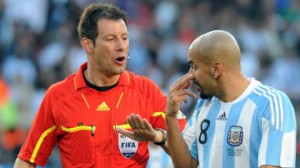
German referee Wolfgang Stark (L) talks with Argentina's midfielder Juan Sebastian Veron during Argentina vs Nigeria their Group B first round 2010 World Cup football match on June 12, 2010 at Ellis Park stadium in Johannesburg.
John Doyle
The Globe and Mail
Published on Wednesday, June 23, 2010
The best referee is the one who is nearly invisible during a game. Wolfgang Stark, a banker, is in charge of Wednesday’s key game between England and Slovenia and is one of those senior and experienced referees who is mostly invisible but has a history of controversy. Every now and then he does something spectacularly controversial. The luck of the draw means that he’s handling a game that could send England out of the tournament and, if segments of the English press are to be believed, cause a seismic shift in the way soccer is perceived in England.
Stark’s appointment is already a seething sore in England. Former Premier League referee Graham Poll has criticized the choosing of Stark, writing in the Daily Express, “FIFA have caused a conflict of interest with the appointment of Wolfgang Stark for England’s must-win game against Slovenia in Port Elizabeth tomorrow afternoon. The German referee, who has a track record of dishing out cards with abandon, could potentially do his home nation a favour if he were to caution Steven Gerrard and James Milner. If results go a certain way, Fabio Capello’s side could face Germany in the first knockout stage, and as both players have one yellow card to their names already, they would be suspended. While Stark would never deliberately act unfairly, he has been put into a difficult position by this appointment.”
And then there’s England’s John Terry, who has lambasted Stark for the referee’s handling of a Champions League game between Chelsea and Inter Milan earlier this year. Wolfgang Stark has a rep. A big one.
Wolfgang’s Big Moments
One: July 19th 2007, Argentina v Chile, BMO Field, Toronto.
The semi-final of the FIFA Under-20 World Cup. Argentina wins 3-0. Stark lost control of the game early, issuing a red card to a Chilean player in the 14th minute. Late in the game another Chilean was shown a red card. Stark showed six yellow cards to Chile and two to Argentina. To anyone in the stadium, including me, it was clear that Argentina’s young players were diving and exploiting Stark’s inability to recognize play-acting. The mood in the stadium became poisonous. Several Chilean fans tried to argue with Stark at the conclusion, as didthe Chilean players. He needed a police escort to sprint off the field. Later, angry Chilean players were involved in a scuffle with Toronto Police and were arrested.
Two: April 1st 2009. Italy v Ireland, Bari.
A World Cup qualifying game, with Italy playing at home. The game changed dramatically in the 3rd minute when Stark issued a red card to Italy’s Giampaolo Pazzini. Pazzini leapt to head a ball, with Ireland’s John O’Shea going for the same ball. Pazzini’s elbow caught O’Shea’s nose, which began to bleed instantly. Anyone in the stadium, including me – yes, again – saw it was an accidental blow. O’Shea was slow to jump and crashed into the Italian’s arm. But the sight of blood spooked Wolfgang Stark and Pazzini was gone. The game ended in a 1-1 tie. Italy manager Marcello Lippi was apoplectic, and was still condemning the referee hours after the game. Even Ireland’s manager, Giovanni Trapattoni, said afterward that the referee’s decision was “mistaken, even exaggerated”.
Three: March 16th 2010, Chelsea v Inter Milan, Stamford Bridge, London.
A highly charged Champions League in which former Chelsea manager Jose Mourinho, at the time in charge of Inter, sought to eliminate his old club from the competition. Stark showed a red card to Chelsea’s Didier Drogba, minutes before the end of regulation time, for allegedly stamping on Inter Milan’s Thiago Motta. To anyone watching on TV – including me – it was part of a melee, not a deliberate act of malice. Chelsea captain John Terry – expected to play for England on Wednesday – later claimed that Stark was unwilling to talk to him and said the referee showed “disrespect”. In talking to the press, Terry pointedly referred to Stark as “the German referee.”
Good luck, Wolfgang. Good luck England and Slovenia.


